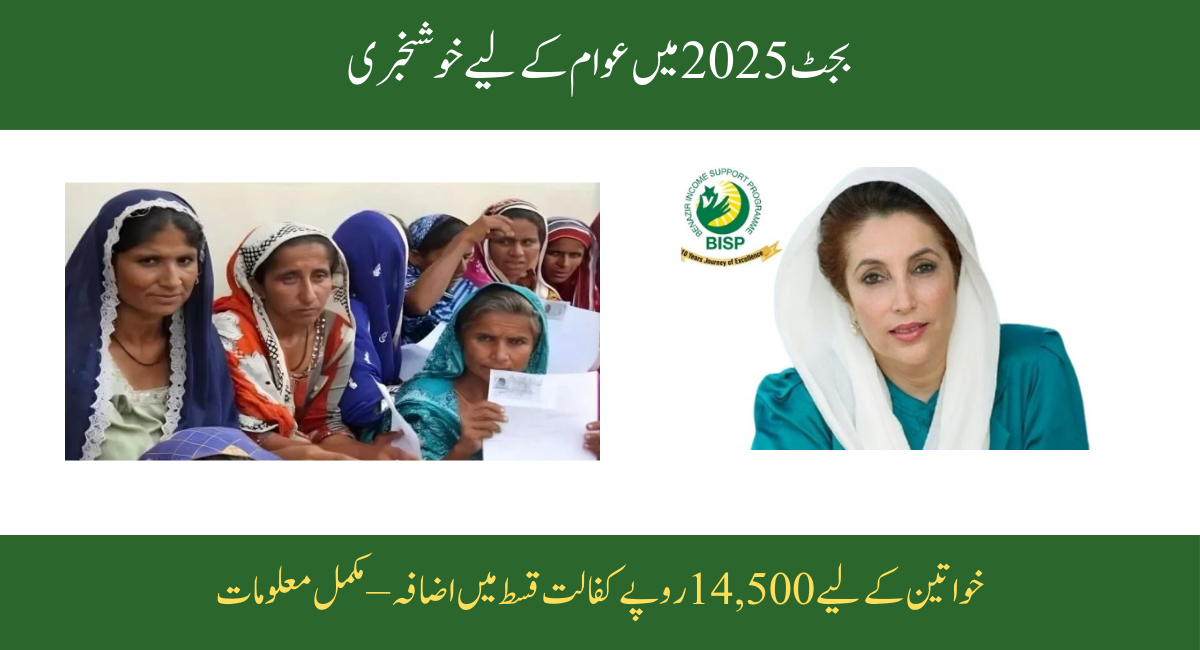The Ehsaas Kafalat Program, part of the Benazir Income Support Program (BISP), is an essential social welfare initiative aimed at providing financial aid to low-income women across Pakistan. Designed to alleviate poverty, this program provides women with monthly or quarterly stipends to support their families’ basic needs. In a significant development under Budget 2025, the government of Pakistan has increased the stipend for women under the Ehsaas Kafalat Program to Rs. 14,500.
This increase is a response to the growing challenges faced by low-income families, particularly women, in the face of rising inflation and increasing living costs. With this increase, the government hopes to improve the economic stability of vulnerable women and empower them to better manage their household expenses, health, and education.
Key Update: The Rs. 14,500 Increase in Installment
The government’s decision to raise the monthly installment to Rs. 14,500 is part of the broader welfare measures introduced in the Budget 2025. The announcement has been welcomed by millions of Pakistani women, who will now receive a larger amount to help them cope with the skyrocketing prices of essential goods.
Why the Increase is Necessary
As inflation continues to rise, the purchasing power of low-income families has decreased significantly. This increase is aimed at bridging the gap between income and the cost of living, particularly for female-headed households who bear the brunt of daily expenditures like healthcare, education, and food.
Who Will Benefit?
The beneficiaries of this increase are women who are already registered under the Ehsaas Kafalat program. These women are typically from families that fall within the poverty line and struggle to meet basic needs. The new payment, effective from Budget 2025 onwards, will help these women manage their day-to-day expenses with greater ease.
Why This Increase Matters?
The increase in the Ehsaas Kafalat installment is more than just a financial boost; it’s a tool for empowering women in Pakistan. Here’s why:
Read more: BISP 8171 Eligibility Check 2025 – Income, Age, and CNIC Verification Made Easy
1. Inflation Adjustment
With rising inflation, the prices of food, medicine, and essential commodities have shot up. The previous stipend amount was no longer enough to cover the increased costs. With the increase to Rs. 14,500, the government aims to help women manage their household costs more effectively.
2. Economic Empowerment
Providing women with a larger sum of money directly allows them to control household spending. This autonomy over financial decisions contributes to economic empowerment, which is key to improving the status of women in society.
3. Support for Education & Healthcare
Many women use the stipend to pay for their children’s education and essential healthcare services. By raising the stipend, the government ensures that families can afford better healthcare and education for their children, thus improving the long-term future of the next generation.
4. Enhanced Standard of Living
The increase in stipend allows women to invest in their families’ welfare, from purchasing nutritious food to maintaining proper healthcare and improving their living conditions.
Eligibility and Application Process
Who is eligible for the Rs. 14,500 Payment?
To qualify for the increased payment of Rs. 14,500, the woman must meet the following criteria:
- Registered under the Ehsaas Kafalat Program: Women who are already part of the BISP program are eligible for the new stipend amount.
- Low-income Status: Beneficiaries must fall under the low-income bracket, as determined by the NADRA 8171 survey.
- Verification Through NADRA: Women must be verified through the NADRA database to ensure they are genuine beneficiaries of the program.
How to Check Eligibility?
There are several ways for women to check their eligibility:
Check out: BISP 2025 Registration Criteria Changes: Updated PMT Score, Income Limits & Reapplication Process
- Send CNIC Number to 8171: Women can send their CNIC to 8171 to check if they are eligible for the increased stipend.
- Visit the Official Website: Go to the official Ehsaas Program website for detailed information and updates.
- Visit a BISP Center: Local BISP registration centers can also provide eligibility information.
What if I’m not registered yet?
New applicants who are not yet registered must visit a nearby BISP registration center and complete the NADRA 8171 registration process. Only after verification will they become eligible for the stipend.
Frequently Asked Questions (FAQs)
1. How Much Will I Receive Under the Ehsaas Kafalat Program?
Eligible women will receive Rs. 14,500 under the Ehsaas Kafalat Program starting from the next payment cycle after the Budget 2025 implementation.
2. Do I Need to Re-register for This Increase?
No, if you are already registered and receiving benefits, you don’t need to re-register. However, new applicants will need to complete the 8171 survey.
3. When Will the New Payment Start?
The new payment of Rs. 14,500 will start after Budget 2025 approval, with the payments being made in the following cycle.
4. Can I Check My Eligibility Online?
Yes, by sending your CNIC to 8171, you can easily check your eligibility.
5. Will all women receive the full Rs. 14,500?
No, only those who meet the updated eligibility criteria will receive the full amount.
Read more info: BISP 2025 Payment Update: Rs. 13,500 Released for Kafalat & Taleemi Wazifa
Conclusion
The increase in the Ehsaas Kafalat stipend to Rs. 14,500 is a crucial step toward supporting women from low-income households in Pakistan. The increase aims to provide financial independence to women, allowing them to take better care of their families and contributing to their overall empowerment. With this move, the government is reaffirming its commitment to reducing poverty and promoting social inclusion, and it will make a significant impact on the lives of the country’s most vulnerable women.
